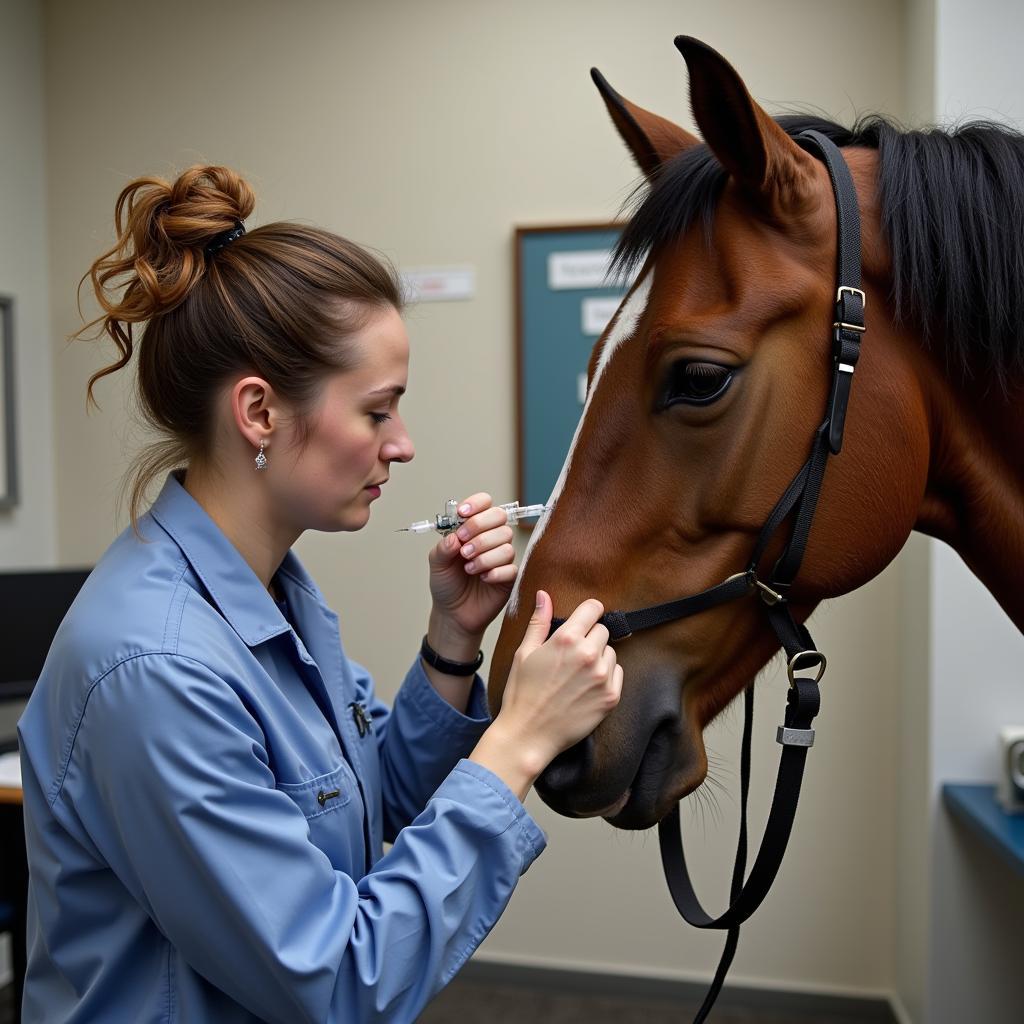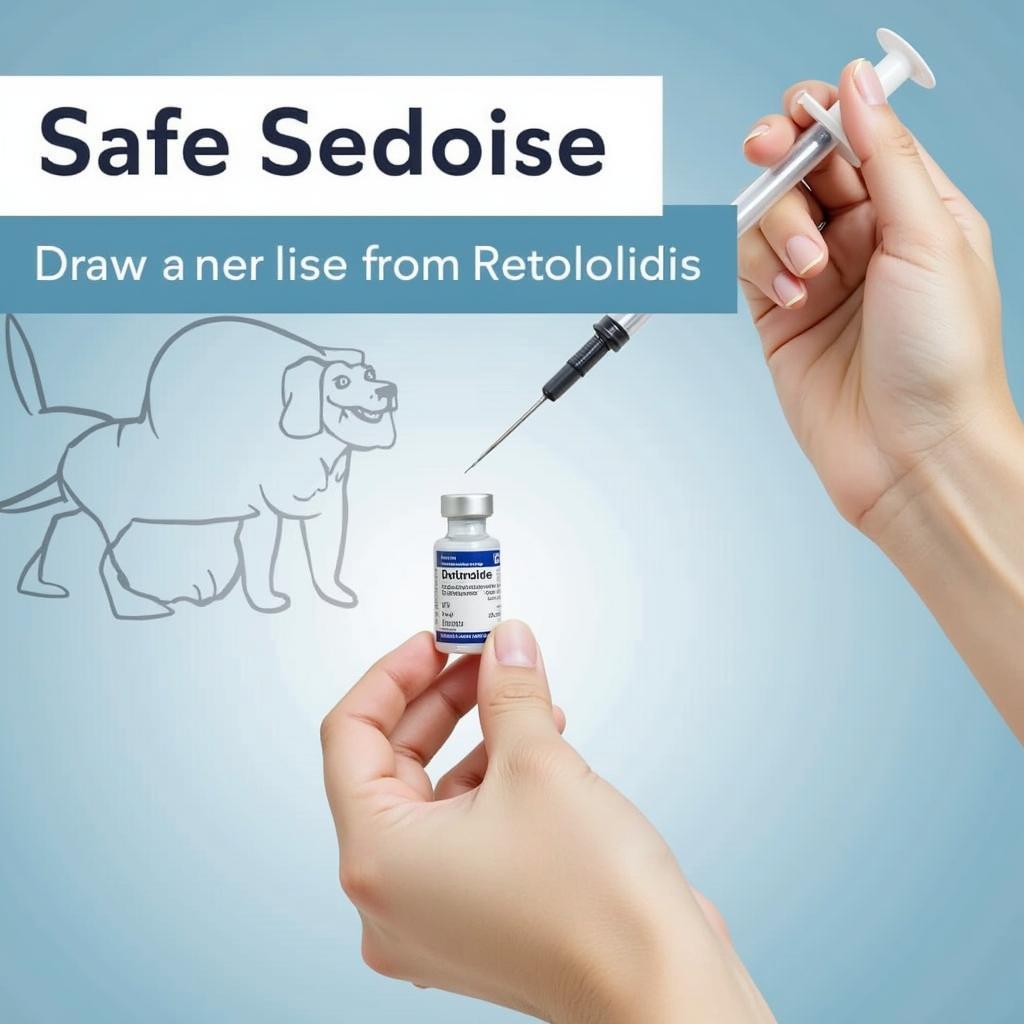Detomidine for horses is a powerful sedative used in a variety of veterinary procedures. Understanding the correct Detomidine Horse Dose is crucial for ensuring the safety and well-being of your equine companion. This comprehensive guide will provide you with everything you need to know about detomidine dosage for horses, including its uses, risks, and administration.
Understanding Detomidine for Horses
Detomidine, often sold under brand names like Dormosedan, is an alpha-2 adrenergic agonist. It works by affecting the sympathetic nervous system, leading to sedation, muscle relaxation, and pain relief. Due to its potent effects, detomidine is a prescription medication and should only be administered by or under the guidance of a qualified veterinarian.
 Administering Detomidine to a Horse
Administering Detomidine to a Horse
What is Detomidine Used For in Horses?
Detomidine is a versatile drug used for various purposes in equine medicine, including:
- Pre-anesthetic medication: Detomidine helps calm and relax horses before general anesthesia for surgical procedures.
- Sedation for minor procedures: It facilitates examinations, dental work, wound treatment, and other short procedures that require a calm and cooperative horse.
- Pain management: Detomidine provides analgesic effects for horses suffering from colic, laminitis, or post-surgical pain.
Detomidine Horse Dose: Finding the Right Balance
Determining the appropriate detomidine dose for your horse is not a one-size-fits-all approach. Several factors come into play, including:
- Weight: Accurate weight measurement is crucial as the dosage is calculated based on the horse’s body weight.
- Age and health condition: Older horses or those with underlying health issues might require dose adjustments.
- Procedure: The intended procedure influences the necessary level of sedation and therefore the dose.
- Route of administration: Detomidine can be administered intravenously (IV), intramuscularly (IM), or orally. Each route affects the drug’s onset and duration of action.
It is essential to consult with your veterinarian to determine the safest and most effective detomidine dose for your horse’s specific needs. Never attempt to calculate or adjust the dosage yourself, as this could lead to serious complications.
 Detomidine Dosage for Horses
Detomidine Dosage for Horses
Risks and Side Effects of Detomidine in Horses
While generally safe when administered appropriately, detomidine can cause side effects in some horses. Common side effects include:
- Bradycardia (slow heart rate): This is a known effect of detomidine and usually resolves on its own. However, monitoring the heart rate is crucial during and after administration.
- Hypotension (low blood pressure): Detomidine can cause a drop in blood pressure, which may necessitate supportive care.
- Ataxia (loss of coordination): Some horses may exhibit unsteadiness or wobbliness, requiring careful handling.
- Respiratory depression: Detomidine can suppress breathing, especially at higher doses. Close monitoring is vital.
- Sweating and muscle tremors: These side effects are typically mild and transient.
In rare cases, more serious complications like colic or allergic reactions can occur. Immediate veterinary attention is paramount if you notice any unusual or concerning symptoms after detomidine administration.
Reversing Detomidine’s Effects
Detomidine’s effects can be reversed using an antagonist medication like atipamezole (Antisedan). This reversal agent blocks the effects of detomidine, helping the horse recover more quickly from sedation.
Detomidine vs. Other Sedatives: Exploring Your Options
Detomidine is not the only sedative used in horses. Other options, like xylazine (Rompun) and acepromazine, are also available. Each drug has its own unique properties, advantages, and disadvantages. Your veterinarian can help determine the most appropriate non-prescription sedative for horses based on the specific situation. If you are looking for information on a specific drug, such as the dormosedan dosage for horses, your veterinarian can provide specific guidance.
Conclusion
Detomidine is a potent and valuable tool in equine veterinary medicine when used responsibly and under professional supervision. Understanding the factors influencing detomidine horse dose, potential side effects, and the importance of veterinary guidance is crucial for ensuring the safety and well-being of your horse. Remember, always consult with your veterinarian for personalized advice and dosage recommendations.
FAQs about Detomidine Horse Dose
Can I administer detomidine to my horse myself?
No, detomidine is a prescription medication and should only be administered by or under the direct supervision of a licensed veterinarian.
How long does it take for detomidine to take effect in horses?
The onset of action depends on the route of administration. Intravenous administration results in rapid sedation (within minutes), while intramuscular injection takes slightly longer (15-30 minutes).
How long does detomidine last in horses?
The duration of sedation varies depending on the dose and individual horse but typically lasts 1-2 hours. However, some effects might linger for a longer duration.
Can detomidine be used in pregnant or lactating mares?
The safety of detomidine in pregnant or lactating mares has not been fully established. Therefore, it’s best to consult your veterinarian before using this medication in these situations.
What should I do if I suspect my horse has overdosed on detomidine?
Immediately contact your veterinarian or an equine emergency service. Overdose can lead to severe side effects and requires prompt medical intervention.
For any concerns or questions about detomidine horse dose, don’t hesitate to contact our team at Justus Horses USA. Call us at 0772127271, email us at [email protected], or visit our location at QGM2+WX2, Vị Trung, Vị Thuỷ, Hậu Giang, Vietnam. We are available 24/7 to address your inquiries and provide expert advice on equine health and care.